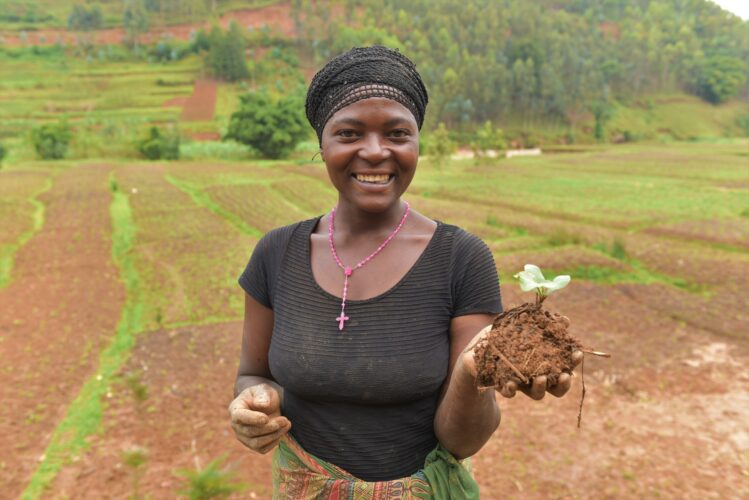With a median age of 19, Africa has the youngest population in the world. This demographic dynamism presents a compelling case for governments, international organizations, the private sector, and more to prioritize the creation of professional opportunities for youth across the continent.
At the event convened by the Food and Agriculture Organization of the United Nations, the Southern African Confederation of Agricultural Unions (SACAU), AGRA and the CGIAR Gender Platform as part of the Africa Food Systems Forum (AGRF) 2023, the discussions were centred on not only creating sustainable jobs for youth but also showcasing the myriad opportunities available in the agriculture and agrifood sectors.
“Don’t sell agriculture to the young, sell opportunities. As long as there are opportunities, especially in entrepreneurship, young people will go for it,” said Ishmael Sunga, Chief Executive Officer at SACAU.
Nomathemba Mhlanga, leading FAO’s work on decent employment opportunities in Africa, especially for youth and women, also pointed out that conversations on transforming agrifood systems in Africa must take youth into account.
“Youth are already harnessing opportunities offered. They are at the forefront of the transition, but they are among the most vulnerable groups as they face multiple challenges, especially those brought by climate change. By embracing the skills and ideas of young people, the agriculture sector can transform into a solution for the climate crisis rather than a contributor to the problem,” she said.
Young people set the example
The session saw the participation of young leaders setting the example, such as Daniel Opanga from the United Republic of Tanzania’s Sweet Potato Seed Producers Association, Pauline Lingg from the Ghana Food Movement and William Madudike, President of the Youth Board of the Zimbabwe Farmers Union.
“It’s not about making agriculture sexy or cool. It’s about highlighting the economic opportunities,” Maduduke said.
“Food connects us all here today. It’s powerful, it’s politics. Food is also about employment and the future of youth. Food is a way to connect,” Lingg said.
Daniel Opanga emphasized that every value chain presents a range of opportunities to be seized. For example, the rising demand for byproducts of sweet potatoes creates excellent opportunities for potential new businesses, he said.
Support from institutions
The high-level panel that followed was attended by Hussein Mohamed Omar, Deputy Permanent Secretary, Ministry of Agriculture of the United Republic of Tanzania, Eileen Nchanji from the Alliance of Bioversity International and CIAT, and Edson Mpyisi from the African Development Bank (AfDB).
“Tanzania has three main objectives: increase productivity, increase export value, and create new jobs. Whatever we do for youth, they should be at the centre stage,” Omar said.
Edson Mpyisi said he was pleased to see more and more attention being placed on young people at the AGRF. He also outlined the areas where the AfDB is investing to support young people to become the farmers and agribusiness entrepreneurs of today and tomorrow: improved policies, youth incubation, and access to finance.
Finally, Eileen Nchanji highlighted the crucial role of the private sector in assisting and providing opportunities for young farmers and agripreneurs. “Enough training, let’s invest in projects and help bring them to scale,” she said.
Youth: a cross-cutting theme for FAO
In the FAO Strategic Framework 2022-2031, FAO has highlighted the importance of youth as managers of global and Africa’s agrifood systems. As such, the Organization is working with them to ensure inclusive economic development that is resilient to future crises and shocks and contributes to realizing the Sustainable Development Goals.
The Opportunities for Youth in Africa (OYA) programme, developed jointly with UNIDO, and implemented in collaboration with the African Union Commission (AUC) works to accelerate efforts in job creation for African youth, primarily through agribusiness and entrepreneurship development.
The Integrated Country Approach (ICA) was implemented to boost decent jobs for youth in agrifood systems. The approach emphasizes strengthening the capacities of national institutions responsible for agriculture and labour to promote decent rural employment, including through private-public partnerships and multi-stakeholder mechanisms.
The African Youth Agripreneurs (AYA) platform, an initiative supported by FAO and the East African Farmer Federation (EAFF), encourages experience-sharing, networking and mentorship among young African agripreneurs, as well as access to tools and training. The platform has brought together and engages over 3,000 young people across Africa.
William Madudike received the loudest applause of the session when he said, “One question I often hear is, what are youths bringing to the table? The youths are the table.”
Article from FAO Africa

